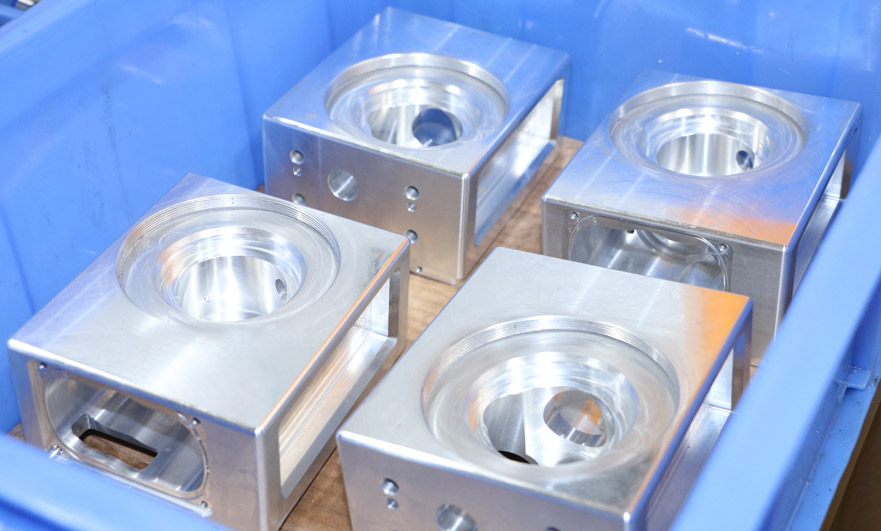For enterprises to choose large-scale CNC machining or small-batch CNC machining, they will pay more attention to the annual production volume. At the simplest level, the manufacturing of CNC machining parts must be simplified in large quantities, that is, the manufacturing should be as standardized as possible, easy to measure, and easy to inspect. However, because the output of small batches is not large, it is best to manufacture them on the existing equipment in the factory as much as possible. Do not add more equipment and tooling, etc., which directly affects the cost of CNC machining parts. What are the differences between large batch CNC machining and small batch CNC machining? Today, CNCMF will explain the difference between large and small batch CNC machining and how to efficiently improve the seven methods of aluminum CNC machining?

There are three major differences between small batch CNC machining and large batch CNC machining:
1. CNC machining efficiency is different:
In simple terms, small batch CNC machining is generally the usual mechanical CNC machining processes such as turning, milling, planing, grinding, pliers, etc., and the fitter’s blanking, line drawing, drilling, tapping, etc. For large-scale CNC machining, it is necessary to open molds; such as plastic molds, die-casting molds, cold stamping molds, etc., to make tooling; such as milling fixtures, grinding fixtures, turning fixtures, and drill fixtures for fitters and other special fixtures.
Large-scale CNC production should be considered: process arrangements such as rapid card loading and reduction of waiting time, and more tooling and fixtures that can improve the speed should be made; and there is no need to consider these for single-piece small batches. As for CNC machining allowance, this is related to CNC machining time, CNC machining accuracy, etc., and has little to do with batch size, so the efficiency of CNC machining between the two is different.
2. The number of CNC machining parts is different:
High-volume CNC machining means that a product is produced in a large number of batches. For example, a CNC machining parts factory produces a model of CNC machining parts in one assembly line and keeps doing it; or some CNC machining factories produce one product for a month; or There is one product to do for a week. High-volume CNC machining is a relative concept, defined according to the demand characteristics of CNC machined parts.
In small batch CNC machining, the production volume of a single model product is very small. For example, a few pieces of proofing can be made at a time, and several different models of CNC machined parts can be proofed in one day. In this way, there will be relatively few semi-finished products at the breakpoint on the production line, and of course, the inventory of raw materials and finished products will also decrease a lot.
3. The switching frequency is different
Large-scale CNC machining must pursue continuity and reduce switching. Because switching will bring time loss and cost. The key to realizing small batch CNC machining is to achieve fast switching, otherwise it will bring a lot of waste, and it is better to save time and effort than mass production.

Seven factors to improve the accuracy of aluminum CNC machining parts:
Knowing about high-volume aluminum CNC machining parts and small-volume aluminum CNC machining parts, we can better find aluminum CNC machining parts factories and companies that serve us. Whether it is high-volume CNC machining or small-batch CNC machining, it is particularly important to improve the quality of CNC machined parts. The specific methods are as follows:
1. Reasonable use of CNC machining tools
The smooth knife of CNC machining steel and copper should be strictly distinguished and used, and the allowance of the smooth knife should be reasonable, so that the lubricity of the workpiece and the service life of the tool will be better.
2. Before CNC machining, use the calibration table to check whether the tool can swing within the allowable tolerance range. The tool head and lock nozzle should be blown clean with an air gun before CNC machining, or wiped with a cloth before installing the tool. It is too dirty. The precision and quality of CNC machined parts have a certain impact.
3. When clamping, pay attention to whether the name and model of the CNC machined part and the program sheet are the same, whether the data size can be matched, whether the clamping height is high enough, and the number of calipers used.
4. The CNC machining program should be different from the reference angle direction marked by the mold, and then check whether the 3D picture is correct, especially the workpiece that has been drilled and transported water. Whether the water can be different, if you are not sure, you should promptly respond to the programmer or ask a fitter to check the 2D drawing to see if the 2D and 3D reference angles are different.
5. The program list of the CNC machining file should be normalized, including the model number, title, program name, processing content, tool size, feed amount, especially the safe length of tool clamping, the reserved allowance for each program, and the smooth knife. , It should be clearly marked, the center of the R surface and the plane should be connected, and it should be marked on the program sheet, the operator should advance 0.02 ~ 0.05MM in the CNC machining process first, stop after a few knives to see if it can work If it goes well, feel with your hand to see if you can start the stage, if not, lower the gong.
6. Before CNC machining, it is necessary to understand the content of the program sheet for CNC machining. The program sheet must have a 2D or 3D diagram, and the hexagonal data of “X length, Y width, and Z height” should be marked.
As long as there is a plane, the “Z” value should be marked. It is convenient for the operator to check whether the data is correct before CNC machining. If there is a tolerance, the tolerance data should be indicated.
7. The operator should strictly control the machining speed of the machine tool. The F speed and the S spindle speed should be reasonably adjusted to each other. When the F speed is fast, it should be faster than the S spindle, and the feed speed in different areas should be adjusted. After the CNC machining is completed, you can get off the machine before checking the quality if there is no problem, so as to achieve a complete machining.
The above CNCMF summarizes the seven factors that improve the accuracy of aluminum CNC machining and the difference between large and small batch CNC machining. Seeing this, I have a certain understanding of improving aluminum CNC machining accuracy and CNC batch processing. This is the experience summed up by CNCMFcnc machining masters for many years.

CNCMF is mainly engaged in custom precision CNC machining parts, metal and plastic prototype processing, and its business covers 62 countries around the world, covering military, medical, semiconductor, automotive and other fields. 40+ materials and 15+ surface finish options with free service design, project reviews and DFM analysis. To ensure the quality of parts, we passed the ISO9001 quality system and SGS on-site factory audit in 2015. No matter how complex your part structure is, or your product encounters technical problems, we can provide you with professional service! Save 15% of time cost and communication cost for you!